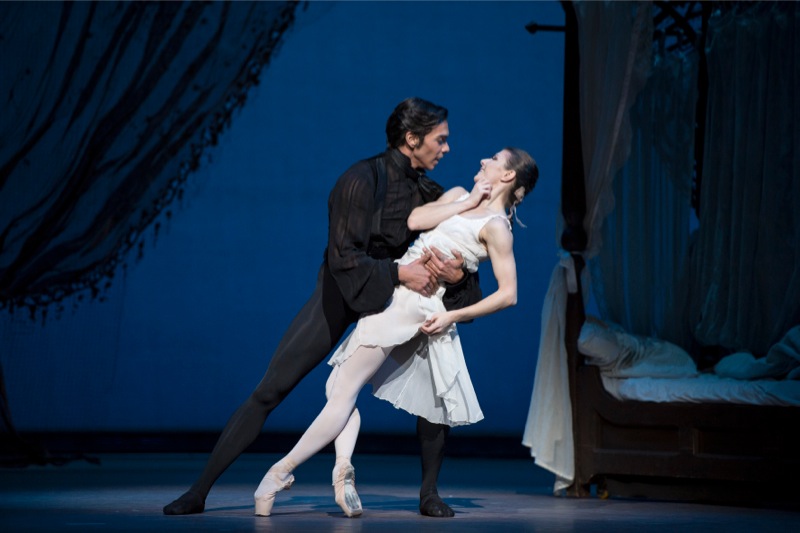Onegin, with Reilly and Cojocaru, Royal Ballet, Covent Garden, January 2013
Posted on 24 January 2013This performance on January 23 showed an interesting difference of interpretation from the previous evening with a cast led by Bonelli and Morera. In her Act III pas-de-deux with Prince Gremin, Alina Cojocaru expressed a wistful sadness as she floated almost semi-consciously across the stage, quite different from Laura Morera’s joyful serenity in the same duet. Had she seen Onegin from the corner of her eye? These are two interpretations of the same role, both entirely valid.

Reilly and Cojocaru, all images ROH/ Bill Cooper
Cojocaru was originally to have been dancing with Johan Kobborg, but due to injury, Jason Reilly from the Stuttgart Ballet took the role of Onegin. This is the company that originally facilitated John Cranko’s work in 1969, providing him with an excellent score by Kurt-Heinz Stolze, that uses music by Tchaikovsky, avoiding anything from his opera on the same story. Reilly showed a reserved aloofness and elegant stage-presence fitting the role like a glove. The way he smiled in Act I when he glanced at the book Tatiana was reading, and the way he placed his hand on her shoulder after tearing up her letter, displayed an effortless superiority that he only loses in Act III on encountering a more mature Tatiana with her husband.

Reilly as Onegin, Act II
In the meantime Cojocaru was walking on air in her first Act I pas-de-deux with him, and her duet with the imaginary Onegin in the letter scene was magical. So different from their final pas-de-deux in Act III when she showed herself to be in emotional agony, almost unable to tell him to leave her. Reilly himself was a terrific partner, so real in his emotional self-control.

Steven McRae as Lensky
By comparison of course, Lensky loses it, and Steven McRae expressed his angry determination to perfection. Before this his superb dancing thoroughly enlivened Act I, and the joyfulness of his dancing with the Olga of Akane Takada was palpable. There was an airy quality to their pas-de-deux, with her seeming as light as a feather, and his final landing as he drops to the stage at the end was done with consummate ease. In Act II Takada did a wonderful job of showing what a very silly girl Olga is, which in Pushkin’s original is the reason Onegin flirts with her, to show Lensky he is in love with an airhead. Takada, McRae and Cojocaru were excellent in their brief pas-de-trois before the duel, and McRae’s final solo was fabulous.
Bennet Gartside was a solid Prince Gremin, but one can see why Tatiana might feel a wistfulness that a more excitingly emotional life has passed her by, as Cojocaru expressed in Act III. She is exceptional in this role so see her if you can.
Once again Dominic Grier in the orchestra pit produced orchestral playing of very fine quality, and the charm and emotional grip of the score came over beautifully.
Performances with various casts continue until February 8 — for details click here.


Reblogged this on Windruffles and commented:
This guy: http://toursenlair.blogspot.ca/2013/01/article-about-jason-reilly.html was wonderful in this beautiful production we saw last night, thanks to two friends. I believe Jason Reilly is the sort of dancer that could bring ballet to be of wider appeal: all dancers were good, but his masculine presence, his exquisite elegance, all that strength and yet effortless grace, made sure that he could pull off making us sympathetic towards such an anti-hero as Onegin (when I read the summary of the story, I said, “Ah! he’s a git!”. Tatiana was believable, realistic, and obviously a beautiful dancer, but as far as I’m concerned, he completely stole the show.